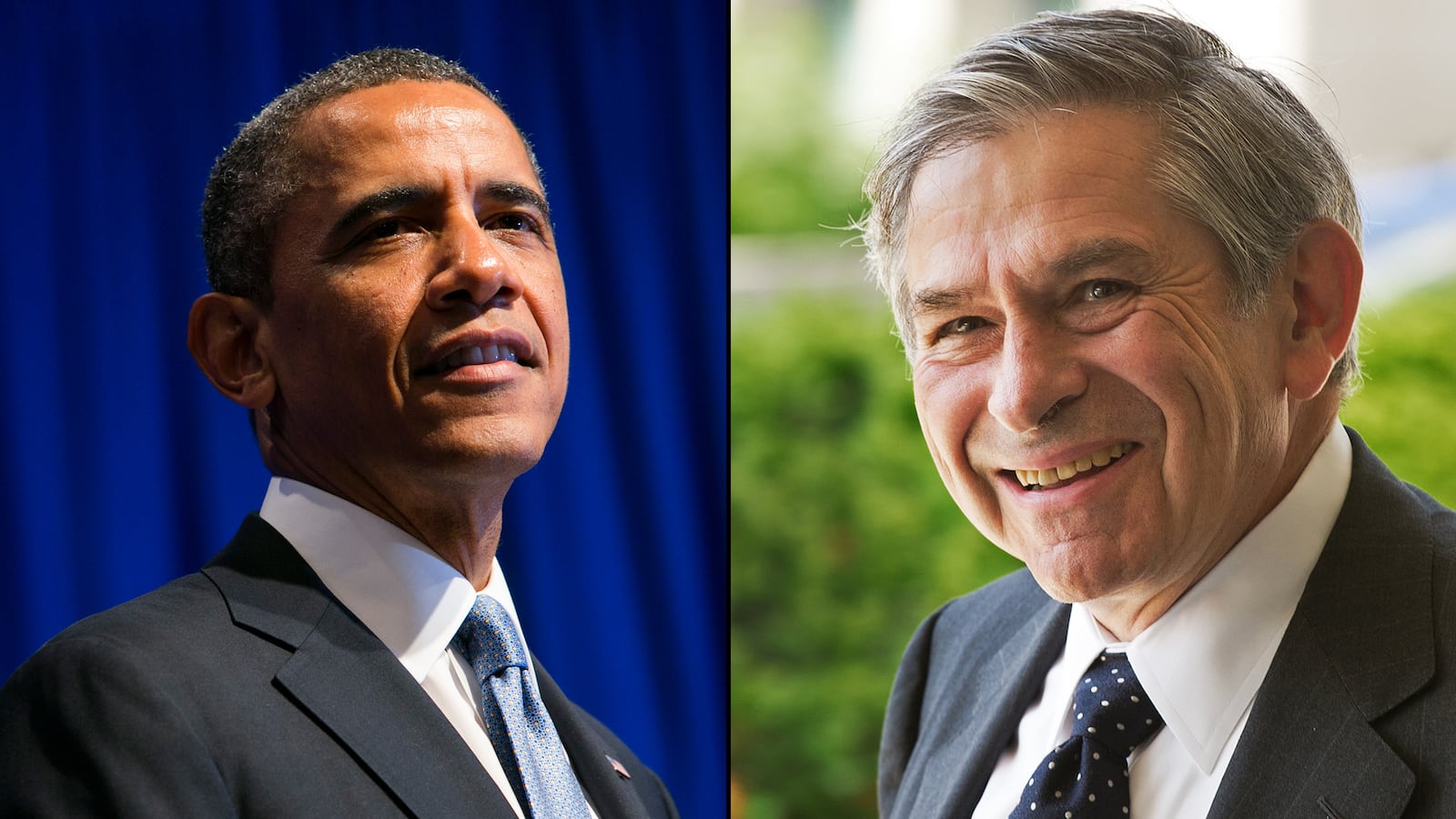As President Barack Obama makes the case for airstrikes in Syria, one of his chief tasks is to persuade Congress and the American people that this is not another Iraq. He has an unusual ally in this effort: Paul Wolfowitz, the former deputy secretary of Defense for George W. Bush and one of the chief architects of the 2003 Iraq War.

“People are saying this is not Iraq, and it's correct,” Wolfowitz tells The Daily Beast. “We are not talking about sending American troops in to change a regime. The administration seems to be talking about a low-risk military operation, one that involves putting very few American lives at risk.”
Wolfowitz says the situation in Syria today reminds him more of the aftermath of the first Gulf War in 1991, when Iraqi Shiites began an uprising against Saddam Hussein and the United States did nothing to help them. Colin Powell, who was the chairman of the Joint Chiefs of Staff at the time, ruled out attacks on Iraq’s retreating army, saying it would be a “turkey shoot.”
“It’s not Iraq 2003. It’s Iraq in 1991,” says Wolfowitz, now a senior fellow at the American Enterprise Institute, a conservative think tank. “In 1991 we had an opportunity without putting any American lives at risk to enable the Shia uprisings against Saddam to succeed. Instead we sat on our hands and watched him kill tens of thousands. We did nothing and we could have very easily enabled those rebellions to succeed. I think if we had done so we could have gotten rid of Saddam Hussein and there would not have been a second war.”
Wolfowitz, who has often been described in the press as a neoconservative, talked about Syria this week in the language of the liberal interventionist. At one point in the interview he said one of the strongest reasons for intervening in Syria now is to win support for the U.S. in the wider region.
The cause of the Syrian people, he believes, “has more sympathy across the Arab world than even the Arab-Israeli issue.” Which means there’s an additional upside to a strike in terms of America’s standing in the region. “We should support Israel, but we pay a price for it. We should be supporting the Syrian opposition, but we would not pay a price for it; we would be rewarded for it.”
His calculation is drawn in part by the response of the Libyan people following the fall of Muammar Gaddafi. He says he remembers seeing a photograph of a billboard in Tripoli that thanked the supporters of the Libyan revolution and included the U.S. and NATO. “There could have been that billboard in Damascus,” he says. “But we have waited so long to do anything.”
This is not the first time Wolfowitz has strayed from the perceived neocon script. In 2002, Wolfowitz spoke at a pro-Israel rally and was booed when he said that innocent Palestinians were also suffering during the war that followed the collapse of the Oslo peace process in 2000. In this same period, he struck up a friendship with the writer Christopher Hitchens, a progressive who came to be one of the most forceful advocates for the war in Iraq.
In the interview, Wolfowitz uses the language of the left to describe the Syrian opposition, calling the fighters a “resistance.” He says the most important decision Obama could make would be to strengthen U.S. support to that opposition. “We have to try to support the resistance and moderate elements of the resistance,” Wolfowitz says. “This is what we have to do.”
But he says American-led occupations now and in the future may not be realistic in the absence of a major attack like 9/11. “In both Afghanistan and Iraq we may have overreached,” Wolfowitz says. “I was in favor from the beginning of handing over authority to Iraqis, let them make the mistakes instead of Americans.” Wolfowitz says that when opposition groups aligned with American interests “take responsibility for fighting and dying, when you have people ready to do that, you should support them.”
The Wolfowitz position is supported by some Republicans in Congress, including Sen. John McCain. But the early vote counts suggest that at least for now, Wolfowitz is out of sync with the mainstream of the Republican Party when it comes to intervention. Only three Republicans on the Senate Foreign Relations Committee this week voted to authorize force for Syria.
“Part of what you are seeing on the Hill is complete lack of confidence in the president and a complete failure on his part to explain what he is going to do and how it is going to make a difference,” Wolfowitz says. “He has left the best Republicans in a very bad situation, and it’s not surprising that some are left to say let the Middle East stew in its own juices.”
“The Republican Party was very robust in supporting policies that would protect the United States from another 9/11,” Wolfowitz says. “That is not what's at stake here. You are not having to explain sending hundreds of thousands of troops into combat.” He says Republicans should remember their reluctance to support President Bill Clinton’s efforts to intervene in the Balkans in the 1990s. At the time, some GOP leadership supported action, but many rank-and-file Republicans were against it.






